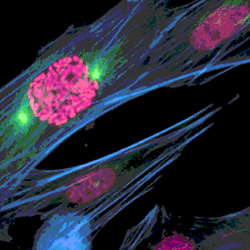 Introduction
Introduction
The Biology of Cells course is run jointly by the Departments of Biochemistry, Genetics, Plant Sciences and Zoology, each of which is responsible for a quarter of the lectures and practicals. In designing the course, we have assumed that many of those taking it will know little or no biology at the outset but we do assume a knowledge of post-GCSE Chemistry.
Lectures
The first four lectures of the Michaelmas Term provide an introduction to the course by considering the organization of eukaryotic and prokaryotic cells, the methods used to investigate their structure and the functional significance of their sub-cellular organization. The next five lectures are an introduction to the essential biochemistry of living cells, describing the different classes of biological macromolecules and their roles in living systems. This is followed by a detailed consideration of the structure and properties of cell membranes and the mechanisms by which substances are transported across them. The chemical changes (both synthetic and degradative) which occur in cells are the subject of the next block of lectures and the Michaelmas Term ends with an account of the ways in which cells obtain, store and manipulate energy.
In the Lent Term the course deals with the structure, inheritance and expression of the cell's genetic material. The first seven lectures deal with the principles of genetic analysis in haploid and diploid organisms, the nature of genes and the role of chromosomes in heredity together with the genetics of prokaryotes and the advent of genetic engineering. Next, we consider the way in which genetics can be understood at the molecular level in terms of the replication, transcription and translation of DNA. These lectures are followed by a consideration of recombinant DNA technology, the revolution this has produced in our understanding of cell biology over the last two decades and its contribution to understanding the genetic basis of disease. The term ends with lectures on cell growth and proliferation including the causes and consequences of uncontrolled division and the way in which the normal processes of growth are subverted during viral infection.
The Easter Term begins with six lectures on cell communication, including cell recognition and adhesion, and the ways in which cells respond to external signals. The course ends with six lectures on the role of cells in the development of higher organisms. Mechanisms of differentiation of plant and animal cells are discussed, with particular reference to the genetics of development.
Practicals
Since biology is an experimental subject, we believe it is essential that any course provides "hands-on" experience of the major techniques and experimental approaches, and an opportunity to see a wide range of relevant material. The Biology of Cells practicals are therefore an integral part of the course and attendance at them is essential.
On-line learning resources – Moodle
On-line learning resources for all NST Part IA Courses will be available through Moodle: www.vle.cam.ac.uk
Contact
If you require more information, please contact the Course Organiser, Dr Marco Geymonat.
